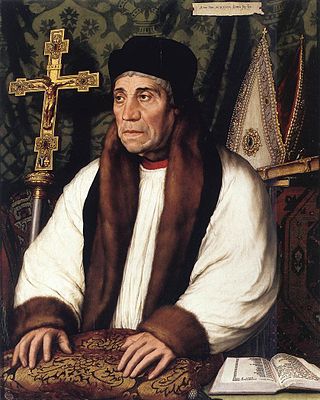Life
A native of Durham, Watson was educated at St John's College, Cambridge, where he proceeded B.A. in 1566. [1] For some time he resided with Thomas Gawdy, then recorder of Norwich, at his residence Gawdy Hall in Harleston, Norfolk. He commenced M.A. in 1569, and his name occurs in the list of the opponents of the new statutes of the university in 1572. [2]
Watson was ordained deacon at Norwich in 1574. [1] It is supposed that he died before 12 June 1581, when the Stationers' Company licensed to Henry Carre "a lamentation for the death of Mr. Christofer Watson, mynister". [2] He has been tentatively identified with the Christopher Watson who was appointed rector of Bircham Newton, Norfolk, in 1573, and also resigned the rectory of Beechamwell in the same county before 1583. [1]

William Warham was the Archbishop of Canterbury from 1503 to his death in 1532.
Christopher Urswick (1448–1522) was a priest and confessor of Margaret Beaufort. He was Rector of Puttenham, Hertfordshire, and later Dean of Windsor. Urswick is thought to have acted as a go-between in the plotting to place her son Henry VII of England on the throne.
Sir William Coningsby was an English Member of Parliament and a Justice of the King's Bench.
Elizabeth Holland, commonly known as Bess Holland, was an English courtier. She was the mistress of Thomas Howard, 3rd Duke of Norfolk and maid-of-honour to his niece, Anne Boleyn, the second wife of Henry VIII of England.
The Lady Margaret Professorship of Divinity is a senior professorship in Christ Church of the University of Oxford. The professorship was founded from the benefaction of Lady Margaret Beaufort (1443–1509), mother of Henry VII. Its holders were all priests until 2015, when Carol Harrison, a lay theologian, was appointed to the chair.

Sir Francis Gawdy was an English judge. He was a Justice of the King's Bench, and Chief Justice of the Common Pleas. His country seat and estates were in Norfolk.
Sir Thomas Gawdy SL was an English justice and Member of Parliament. He was a member of the Norfolk family of Gawdy, of whom many were lawyers during the 16th and 17th centuries. He was Recorder of Norwich for 16 years. His seat was at Gawdy Hall, Harleston, a grand mansion which, in its final state, was demolished in 1939.

Alexander Neville (1544–1614) was an English scholar, known as a historian and translator and a Member of the House of Commons.
Thomas Scott (1705–1775) was an English nonconformist minister, known as a writer of hymns.
Sir Christopher Rawlinson was an English colonial judge who was Chief Justice of Madras and the first vice-chancellor of the University of Madras.
Thomas Gawdy, of Shotesham and Redenhall, Norfolk, was Serjeant-at-law, an English barrister, Recorder, and member of parliament.
Bassingbourne Gawdy, of West Harling, Norfolk, was an English landowner, magistrate and Member of Parliament (MP).
Robert Harrison was an English lay schoolmaster who became a religious leader as a Protestant Separatist, one of the original Brownists.
Thomas Moundeford M.D. (1550–1630) was an English academic and physician, President of the London College of Physicians for three periods.
John Pory (1502/03–1570) was an English churchman and academic, Master of Corpus Christi College, Cambridge.
Henry Swinden (1716–1772) was an English antiquary, known for his history of Great Yarmouth, Norfolk. He worked as a schoolmaster and then land-surveyor.
Edmund Venables was an English cleric and antiquarian.
Henry Meen (1744–1817) was an English cleric, academic and classical scholar. He is best known as authority on Lycophron.

Edmund Gillingwater was an English antiquarian, interested in the history of Suffolk and in particular Lowestoft.
This page is based on this
Wikipedia article Text is available under the
CC BY-SA 4.0 license; additional terms may apply.
Images, videos and audio are available under their respective licenses.
![]() This article incorporates text from a publication now in the public domain : Lee, Sidney, ed. (1899). "Watson, Christopher". Dictionary of National Biography . Vol. 60. London: Smith, Elder & Co.
This article incorporates text from a publication now in the public domain : Lee, Sidney, ed. (1899). "Watson, Christopher". Dictionary of National Biography . Vol. 60. London: Smith, Elder & Co.


